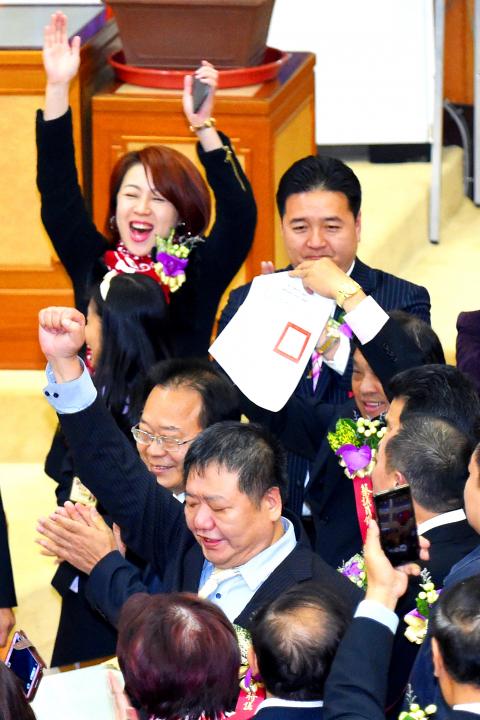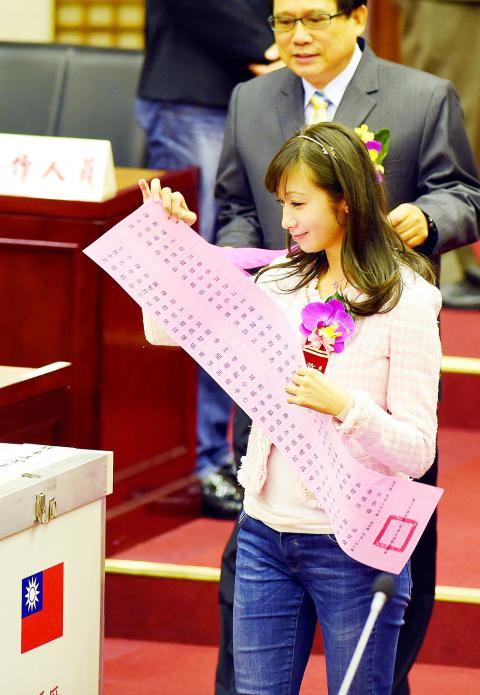On the day of the inauguration of newly elected city, municipality and county heads, 22 councils across the country also voted to choose speakers and deputy speakers.
While the Democratic Progressive Party (DPP) secured the speakers of the Greater Kaohsiung, Yilan County and Chiayi County councils, the Chinese Nationalist Party (KMT) picked up 15, with the remaining four — Hsinchu City, Lienchiang County, Pingtung County and Chiayi City — won by independent councilors.
The Taipei City Council, where the KMT has 28 of the 63 seats and the DPP has 27, is to be presided over by the KMT after the party’s candidate had won by 32 votes to 31 for the DPP’s candidate, while the KMT’s deputy speaker candidate garnered 32 votes to the DPP’s 28.

Photo: Liu Hsin-de, Taipei Times
The New Taipei City Council, which the pan-green camp had expected to win after the DPP threatened to strip the membership of those who did not vote with the party line after 65 years of KMT rule, failed to witness a “color conversion.”
While the DPP has more seats (32) on the New Taipei City Council than the KMT (26), there are seven councilors with no party allegiance and one Taiwan Solidarity Union (TSU) councilor. With TSU Councilor Chang Chin-ting (張晉婷) and a non-affiliated councilor, Chen Shih-rong (陳世榮), being former DPP members, the pan-green camp had expected to have the upper hand in the ballot.
Two rounds of votes, both resulting in a 33-33 tie, were undertaken, before the council finally drew lots, with luck on the side of KMT council speaker candidate Chiang Ken-huang (蔣根煌).

Photo: Liao Chen-huei, Taipei Times
The tie, assuming that all of the DPP councilors toed the party line, indicated that one of the two non-DPP pan-green councilors had not voted as expected.
Chang was rumored to have been the culprit, speculation echoed by DPP Legislator Wu Ping-jui (吳秉叡) and DPP Councilor Liao Hsiao-ching (廖筱清), who directly attributed the loss to the TSU.
The TSU later released a statement saying that the TSU and the DPP had reached a consensus before the vote that the two parties would work together and require their respective party members to toe the party line.
“Following rumors that some [councilors] failed to vote in accordance with party policy, the TSU is to immediately initiate an investigation with the DPP to identify the councilors who breached the agreement and punish them by revoking their party membership,” it said.
Fuming over the outcome of the Tainan City Council vote, the DPP also announced that those who had failed to vote for the party’s own candidates would be severely punished.
To many people’s surprise, the Tainan City Council, where the DPP has a 29-16 advantage over the KMT in terms of seats, selected KMT Councilor Lee Chuan-chiao (李全教) as council speaker, after Lee secured 29 votes to DPP councilor Lai Mei-hui’s (賴美惠) 26.
The DPP said it had expected at least 31 votes, so at least five councilors had not voted as agreed.
DPP Central Review Committee chairman Liu Shih-fang (劉世芳) said that as the party had required all party members to “show their ballots” before putting them in the ballot box as a way to demonstrate their adherence to the party line, “those who failed to do so are seen as the ones who had voted against the party’s candidate and they will face disciplinary action.”
While failing to achieve the expected wins in New Taipei City and Greater Tainan, the DPP did make gains in Greater Kaohsiung and Yilan County, where the party had its speaker candidates elected for the first time in history.
Police installed six surveillance cameras in the Kaohsiung council chamber to monitor the vote and said that those exposing their ballots would be investigated.

Intelligence agents have recorded 510,000 instances of “controversial information” being spread online by the Chinese Communist Party (CCP) so far this year, the National Security Bureau (NSB) said in a report yesterday, as it warned of artificial intelligence (AI) being employed to generate destabilizing misinformation. The bureau submitted a written report to the Legislative Yuan in preparation for National Security Bureau Director-General Tsai Ming-yen’s (蔡明彥) appearance before the Foreign Affairs and National Defense Committee today. The CCP has been using cognitive warfare to divide Taiwanese society by commenting on controversial issues such as Taiwan Semiconductor Manufacturing Co’s (TSMC, 台積電) investments in the

INVESTIGATION: The case is the latest instance of a DPP figure being implicated in an espionage network accused of allegedly leaking information to Chinese intelligence Democratic Progressive Party (DPP) member Ho Jen-chieh (何仁傑) was detained and held incommunicado yesterday on suspicion of spying for China during his tenure as assistant to then-minister of foreign affairs Joseph Wu (吳釗燮). The Taipei District Prosecutors’ Office said Ho was implicated during its investigation into alleged spying activities by former Presidential Office consultant Wu Shang-yu (吳尚雨). Prosecutors said there is reason to believe Ho breached the National Security Act (國家安全法) by leaking classified Ministry of Foreign Affairs information to Chinese intelligence. Following interrogation, prosecutors petitioned the Taipei District Court to detain Ho, citing concerns over potential collusion or tampering of evidence. The

‘COMPREHENSIVE PLAN’: Lin Chia-lung said that the government was ready to talk about a variety of issues, including investment in and purchases from the US The National Stabilization Fund (NSF) yesterday announced that it would step in to staunch stock market losses for the ninth time in the nation’s history. An NSF board meeting, originally scheduled for Monday next week, was moved to yesterday after stocks plummeted in the wake of US President Donald Trump’s announcement of 32 percent tariffs on Taiwan on Wednesday last week. Board members voted to support the stock market with the NT$500 billion (US$15.15 billion) fund, with injections of funds to begin as soon as today. The NSF in 2000 injected NT$120 billion to stabilize stocks, the most ever. The lowest amount it

NEGOTIATIONS: Taiwan has good relations with Washington and the outlook for the negotiations looks promising, Minister of Economic Affairs J.W. Kuo said Taiwan’s GDP growth this year is expected to decrease by 0.43 to 1.61 percentage points due to the effects of US tariffs, National Development Council (NDC) Minister Paul Liu (劉鏡清) said at a meeting of the legislature’s Economics Committee in Taipei yesterday, citing a preliminary estimate by a private research institution. Taiwan’s economy would be significantly affected by the 32 percent “reciprocal” tariffs slapped by the US, which took effect yesterday, Liu said, adding that GDP growth could fall below 3 percent and potentially even dip below 2 percent to 1.53 percent this year. The council has commissioned another institution